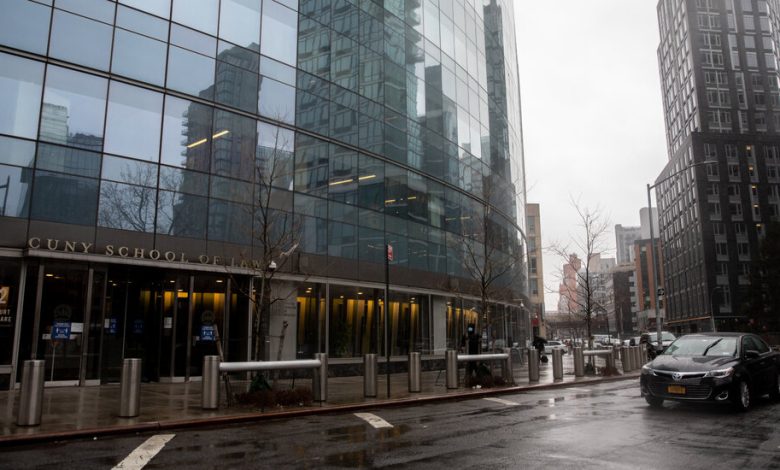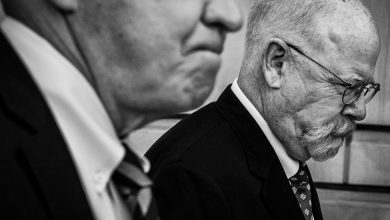She Attacked Israel and the N.Y.P.D. It Made Her Law School a Target.

Commencement season rarely passes without incident. In a bit of counterprogramming, last week the actress Michelle Yeoh addressed Harvard Law School’s Class of 2023, talking about “leaping off high perches into scary voids.” Nevertheless, it was a Yemeni immigrant named Fatima Mousa Mohammed, speaking to her graduating class of the City University of New York School of Law, whose words — absent the genre’s heavy-handed metaphors if not the heavy hand itself — left a more powerful impression on the news cycle.
Within a few weeks, she had achieved a notoriety she could not have expected and was unlikely to want, as her views — which is to say the views of a 24-year-old woman coming out of a small, modestly ranked law school in Queens — became the subject of nearly nonstop, consistently furious international tabloid coverage.
The law school at CUNY exists both as the most diverse in the country and among the most ideologically filtered. Like so many public law schools, it skews toward the production of lawyers who end up working in the interest of the common good. “Law in the service of human needs” is the institutional motto; the politics of resistance remain its dominant ethos.
Two years ago, the dean, Mary Lu Bilek, long known for her commitments to racial justice, resigned after inadvertently likening herself to a “slaveholder” in a meeting in which she had been trying to make the point that she was responsible for whatever injustices remained at the school. Students petitioned for her to turn over the remainder of her salary to the Black Law Students Association and remove her name from their diplomas.
Each year, the law school graduates elect a member of their class to deliver a speech, and this year they chose Ms. Mohammed, an activist devoted to the Palestinian cause. Although her remarks would later be presented as a lightning bolt of antisemitism, she began uncontroversially, talking about the pain and loss of Covid and how it shaped her cohort’s first semesters in law school.
She looked out into the audience now and saw “movement lawyers, business attorneys, professors, librarians,” she said. “I see future lawyers who will defend tenants and not those who dispossess our communities from their homes.” In these instances, her tone was optimistic and celebratory rather than indignant, though there was plenty of indignation.
“Let us remember that Gaza, just this week, has been bombed with the world watching,” she said at one point. “That daily, brown and Black men are being murdered by the state at Rikers.” She praised CUNY as “one of the very few legal institutions created to recognize that the law is a manifestation of white supremacy that continues to oppress and suppress people in this nation and around the world.”
As it happened, much of her commentary fell under the umbrella of conventional leftist rhetoric — the call to fight against capitalism, racism, imperialism — delivered with a zealotry not unfamiliar among the young and warrior-minded. But it was the fierceness she brought to her denunciation of “Israeli settler colonialism” and CUNY’s collaboration with “the fascist N.Y.P.D.” that especially inflamed the political class, even if her own audience, including the law school dean, seemed receptive.
Ms. Mohammed’s remarks went largely unnoticed until The New York Post put her on the cover, more than two weeks after the May 12 graduation, with the headline, “Stark Raving Grad.” Jewish groups, Fox and various news outlets around the world homed in, expressing their horror and disbelief. Elected officials followed. Among them was Ritchie Torres, the Democratic congressman from the Bronx who joined Republican lawmakers, including Senator Ted Cruz, in attacking the foreign policy positions of a young, impassioned person holding no political office or obvious power. (“Imagine being so crazed by hatred for Israel as a Jewish State that you make it the subject of your commencement speech,” Mr. Torres wrote on Twitter last week. “Anti-Israel derangement syndrome at work.”)
Joining the eruption, Mayor Eric Adams called out the speech for its “negativity and divisiveness.” His criticism came 17 days after the fact, even though the mayor spoke at the same graduation, where his words were met by students who turned their backs to him — something that should not have surprised administrators who extended the invitation, given the political leanings of the audience and the fact that the mayor has proposed cuts to the CUNY system broadly.
A spokesman for his office said he had only learned about Ms. Mohammed’s speech over the holiday weekend. But once he heard about what happened he did not limit himself to Twitter analysis; at a Jewish heritage event at Gracie Mansion on Wednesday night, he took the opportunity to say that had he been on the stage when Ms. Mohammed’s comments were made he would have “stood up and denounced them immediately.”
CUNY’s handling of all this has been confounding from the outset and suggests the ways in which public universities dependent on the generosity of political overlords remain particularly vulnerable to the complications around campus free-speech debates. Nine days after Ms. Mohammed’s address, CUNY’s Jewish Law Students Association issued a statement in solidarity with “our friend and classmate Fatima.” Quoting from her remarks that Israel continued to “to indiscriminately rain bullets and bombs on worshipers,” the statement said that it was “disingenuous to characterize these factual descriptions as antisemitic, when they describe the conditions of Palestinian life.”
Answering to different constituencies on May 30 — more than two weeks after the graduation ceremony — CUNY’s chancellor and board of trustees released a statement condemning Ms. Mohammed’s address as “hate speech,” describing her words as “unacceptable’’ and “hurtful to the entire CUNY community.” This was not universally appeasing. Two days later, alumni from the first graduating class, in 1986, sent an open letter to the university’s faculty and administration, maintaining that their legacy had “been disgraced” by the nurturing of a “toxic, intolerant, and antisemitic environment.”
At the same time, law school faculty members at CUNY sent their own letter to the trustees demanding a retraction of their statement, arguing that the suggestion that hate speech includes political affiliation “as a characteristic similar to race or religion is wildly inconsistent with longstanding and legal definitions of the concept of hate speech.”
CUNY seemed unprepared for the fallout, even though, the day before graduation, the university announced an advisory council on Jewish life, made up of prominent Jewish leaders from around the city, to combat hate on its various campuses. If administrators at the law school were not privy to the full slate of what Ms. Mohammed was going to say, they might have anticipated it, given how outspoken she has been about the Israeli-Palestinian conflict both in protests and on social media.
Ultimately, when a school inculcates in its students the importance of speaking out against oppression, it cannot be surprised when, given a big platform, they take you up on it. While any effort to have sent Ms. Mohammed’s speech in a different direction would have inevitably resulted in charges of censorship, it might have saved her from the death threats and vitriol that resulted when her speech surfaced beyond the world of the university, as it seemed destined to do.





